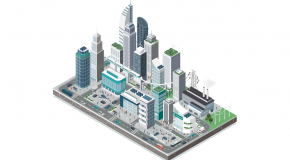In developing cities, cash-strapped governments are often unable to create even the most basic infrastructure—such as sanitation, housing and clean water—required by their citizens. In response, a new generation of social entrepreneurs is stepping in to meet these needs.
In Mumbai, for example, one gap that existed was a lack of emergency transport services. With only 1,000 ambulances operating in the city (many of them with little more than a stretcher inside) and more than 40,000 recorded emergencies a month, a group of Indian business school graduates decided to launch an enterprise that would dramatically improve the availability and quality of services by securing philanthropic seed funding and technical advice and training from the London Ambulance Service and New York Presbyterian Hospital.
The service, called Dial 1298 for Ambulance, works on the principle of cross-subsidisation—funding services for the poor by charging those who can afford them. To determine who should be charged and who should not, the operators answering the phone ask a simple question—which hospital should the patient be taken to? Those asking for private hospitals pay the fee; those heading for government-run institutions pay little or nothing. Similar protocols have proven successful in other Indian healthcare projects, such as the Aravind Eye Care System, whose integrated, needs-driven approach has brought complex surgery within the reach of even the poorest people.
Meanwhile, in Africa, David Kuria, a Kenyan entrepreneur and architect, is taking an innovative approach to the provision of clean toilets in settlements such as Kibera, Nairobi's sprawling slum. Mr Kuria has developed a new concept for public toilets, called the Ikotoilet.
With a smart, colourful design, the Ikotoilet uses new sustainable technologies such as biodigesters and waterless urinals—critical in urban areas that lack clean water supplies. However, the real creativity behind Mr Kuria's innovation lies in the Ikotoilet business model. Clustered around each one are small shops such as newspaper stands, shoeshine stalls and vendors selling airtime for mobile phones.
The idea is that these small businesses— whether organised through a franchise system or youth employment programmes—will subsidise the toilet so that locals need only pay a small fee to use it. Mr Kuria is also seeking corporate branding deals for these mini-malls so that eventually the toilet service could be offered free of charge.
Given the innovative designs and financially sustainable business models of these sorts of social enterprises, city authorities might do well to focus less on being the sole agency for the delivery of city services. Instead, they might consider what kind of support systems and tax incentives are needed to attract more entrepreneurs into the business of providing the services needed to turn urban areas—particularly those in developing countries—into places that are more liveable.





